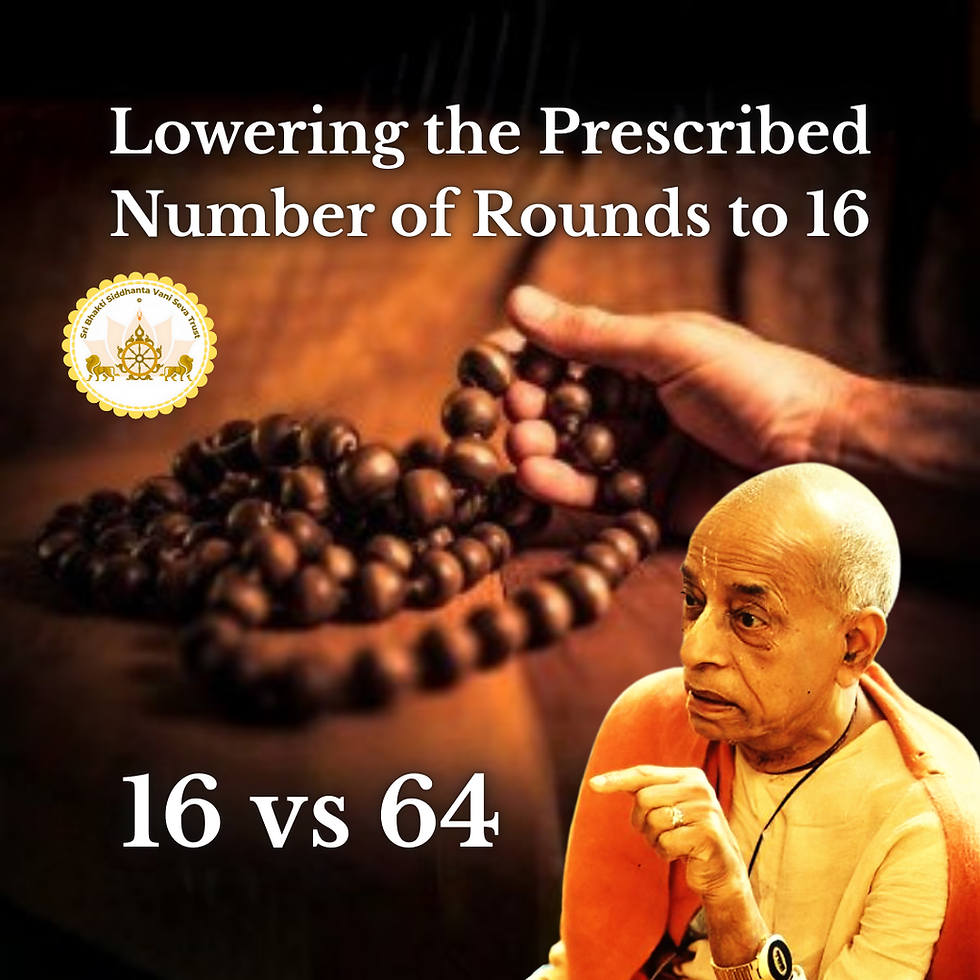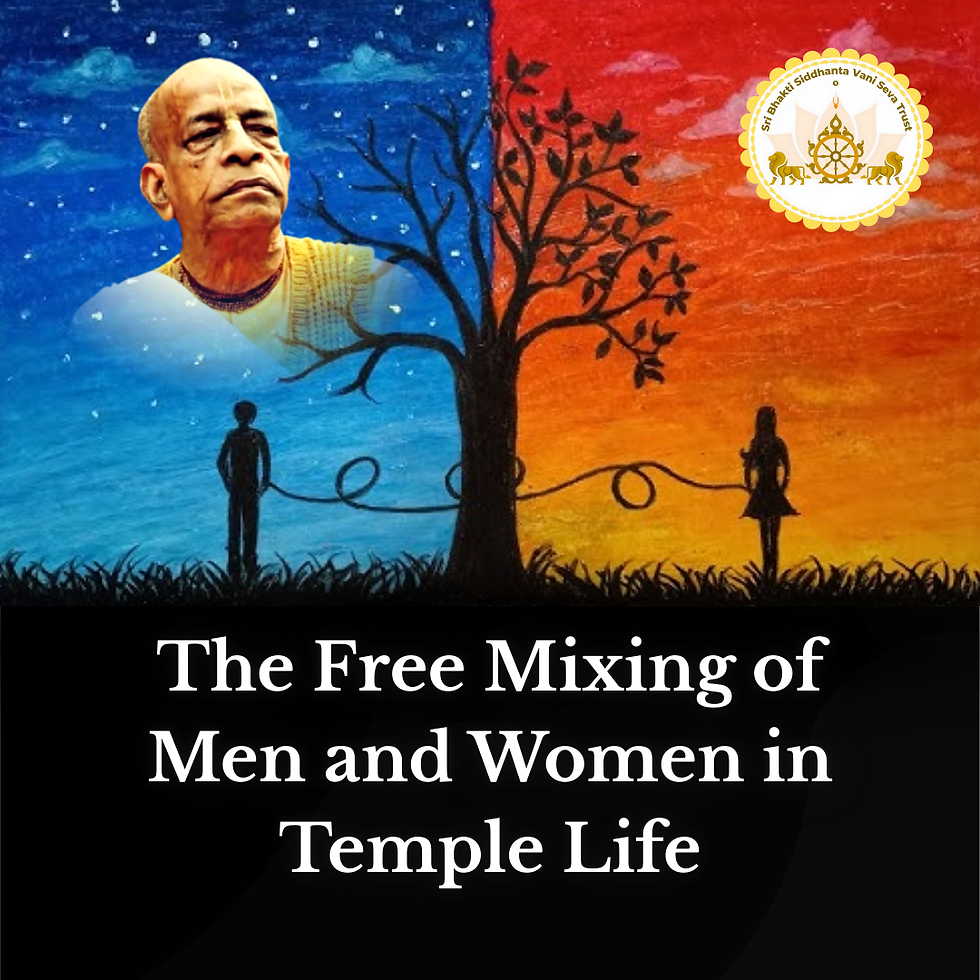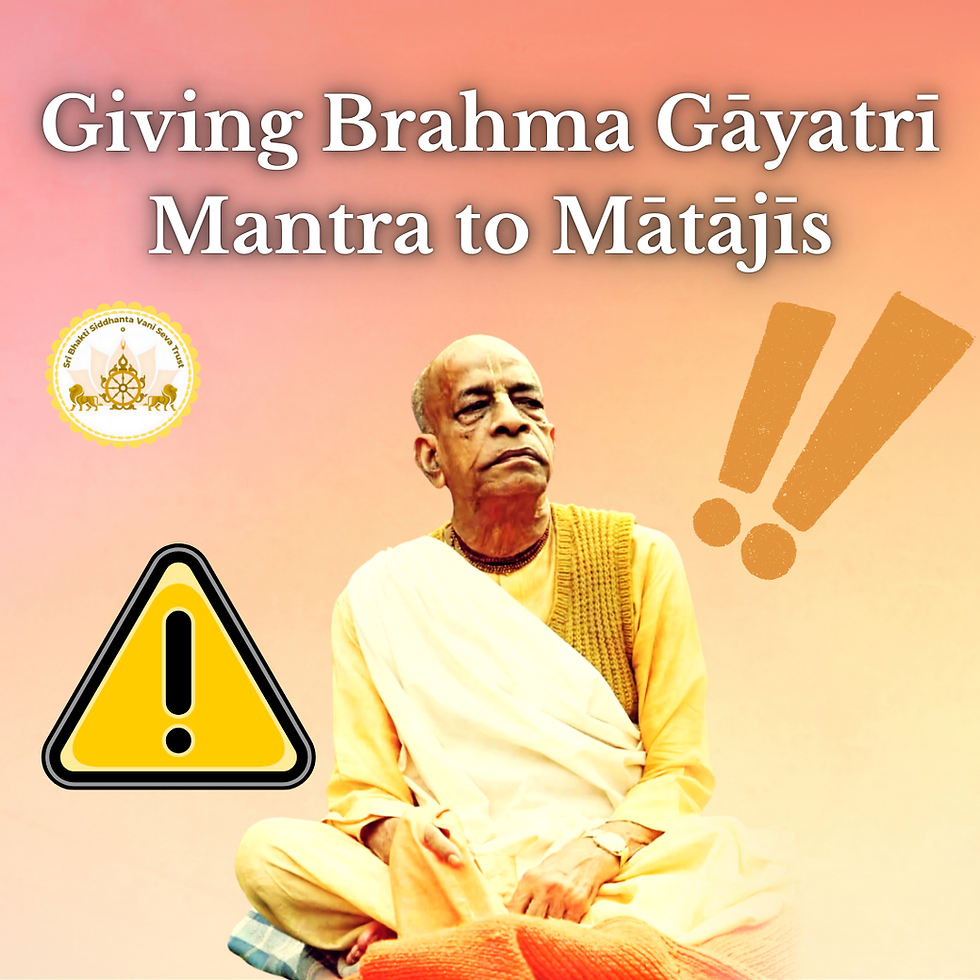Awakening of consciousness? Or an answer to the criticism? – Part 2
- The Symbol of Faith
- May 11, 2025
- 6 min read
Updated: Jul 17, 2025

Awakening of consciousness? Or an answer to the criticism?
(Is Śrīla Saccidānanda Bhaktivinoda Ṭhākura a nitya-siddha bhāgavata pārṣada or a sādhana-siddha?) – Part 2
By sampradāya-saṁrakṣaka Śrī Śyām Dās Babajī Mahārāj
All glories to Śrī Śrī Guru and Gaurāṅga!
Note: In the previous issue, the unparalleled vicāra of Guru-Gauḍīya was published. This is a sincere request to carefully consider the current vicāras.
Can anyone believe that Śaṅkara-ācārya (avatāra of Śiva) himself, who is an eternal pārṣada or associate and avatāra of Bhagavān, propagated or preached the dangerous Māyāvāda commentary by the order of the Supreme Lord? Why does Garuḍa, being an eternal associate of Bhagavān, hunting snakes and fishes? Why does Bhīmasena, an associate of the Supreme Lord, speak of tearing Duhśāsana's chest to drink his blood to fulfill his previous commitment to tie up Draupadī's longtime unbound hair by washing it with that blood? Do you think that his Vaiṣṇava-etiquette still remains after that? The hearts of conditioned souls are devastated by such storms of various doubts and suspicions, and not seeing any ray of hope, they sink into despair or hopelessness.
Śrīla Viśvanātha Cakravartīpāda says that—
“In a siddha (absolutely perfected) personality (eternally siddha or has become siddha through sādhana) who has taken exclusive shelter in ananya-bhakti (one-pointed pure bhakti), there is no evil conduct possible with him; even if it appears as an evil conduct in the eyes of those ignorant people, it is not actually evil, he is truly a sādhu. What to speak of those ignorant people, even “tāṅra vākya, kriyā, mudrā vijñeha nā bujhaya (The actions and expressions of a Vaiṣṇava are beyond the understanding of even an erudite scholar.’’
The idealism of an uttama-adhikārī personality is beyond the judgement of mundane knowledge. That's why Śrīman Mahāprabhu says, —
“suna vipra, mahā-adhikārī yeba haya
tabe tāna doṣa-guṇa kichu na janmayā”
(C.B. Antya-khaṇḍa 6.26)
Translation— “Listen, O brāhmaṇa, when one is highly qualified, one is not affected by faults and virtues.”
na mayy ekānta-bhaktānāṁ guṇa-doṣodbhavā guṇāḥ
sādhūnāṁ sama-cittānāṁ buddheḥ param upeyuṣām
(S.B. 11.20.36)
Translation: “Those who are successful to eliminate any kind of anyābhilāṣītā & anarthas in their lives and are successful to transcend the gross & subtle body-limit to have the power of ātma-darśana in each & every jīva, those who are beyond the limit of prakṛti and are successful to attain that adhokṣaja vastu, such devotees having strong affinity unto my lotus feet, are beyond any possible effect of any sin or virtue incurred through scriptural advice of dos & don'ts.”
However, such a great personality is not to be imitated by anybody else than a qualified soul—
adhikārī bai kare tāhāna ācāra
duhkha paya sei-jana, pāpa janme tāra (30)
rudra vine anye yadi kare visa-pāna
sarvathāa mare, sarva-purāṇa pramāṇa” (31)
(C.B. Antya-khaṇḍa 6.30-31)
Translation: “If anyone other than a qualified person imitates His (Nityānanda’s) behaviour then he has to suffer sorrow and become implicated in sin (30). Just as if anyone other than Rudra (Śiva) drinks venom then he will certainly die—this is the verdict of all the Purāṇas (31).”
In this context Śrīla Śukadeva Gosvāmīpāda says in Śrīmad-Bhāgavatam— “tejīyasāṁ na doṣāya vahneḥ sarva-bhujo yathā”
Which means that, even with those powerful brilliant personalities, if at all some audacious transgression of morality is seen, it is not pollutable for them— these persons are like fire which devours every single thing that is fed to it.
"Observing the external misdeeds of a genuinely great soul, the harsh criticism by a materially judgmental people leads to their own destruction.” This is seen in the Śrī Caitanya Bhāgavata, that—
“eteke ye nā jāniyā ninde tāna karma
nija-dose sei duhkha pāya janma janma (34)
garhita karaye yadi mahā-adhikārī
nindāra ki dāya, tānre hāsilei mari (35)
(C.B. Antya-khaṇḍa 6.30-31)
Translation: “Therefore if a person unknowingly criticizes His (Nityānanda’s) activities, then he suffers birth after birth because of his own faults (34). What to speak of criticizing, if a person even mocks an immoral activity of a highly qualified personality, he is vanquished (35).”
Śrīman Mahāprabhu cautioned us all about Śrīman Nityānanda Prabhu, saying—
madira yavani yadi nityānanda dhare
tathapi brahmara vandya kahila tomare”
(C.B. Antya. 6.12)
Translation: “Even if Nityānanda holds liquor and a muslim lady, still He is adorable even to Brahmā.”
Śrīmad Bhāgavatam reveals that Śrī Garuḍa possesses an apparent flaw of collecting (hunting) fishes and snakes. By watching such an activity, Saubhari Muni cursed Śrī Garuḍa Bhagavān and consequently lost the merit of his sixty thousand years of austerities, falling into intense Māyā (illusion).
From Śrīmad-Bhāgavatam it can also be seen that Vasiṣṭa Muni was offered human flesh. Kalmāṣapāda, under the influence of a demonic power (due to a curse by Vasiṣṭa Muni) was in a position to eat human flesh. Why does the consequence of eating fish become like eating haviṣyānna (a pure offering of grains and ghee) by the influence of Śrī-kṣetra (Jagannātha Purī)?
Why did Indra, the king of heaven, associate with Ahalyā, the wife of Gautama Ṛṣi, and consequently invited upon his own body, a thousand vaginas as a curse given by Gautama Ṛṣi? Why did Bṛhaspati, the guru of the demigods, associate with his brother's wife? Why did Candradeva (the moon god) associate with his guru's wife, Tāra? These or other countless questions which can make the attainment of the lotus feet of Bhagavān, quite impossible. Śrīla Prabhupāda often said, "Logical interpretation cannot stand in the way of that Absolute Truth."
In current society, it is heard that Droṇācārya's injustice towards Ekalavya was not logical at all. The illegitimacy of such mundane judgments has been answered many times in the past, but the current topic is afflicted with such a terrible cancerous disease that it is doubtful whether scriptural justice will even gain entry. The question before us today is whether Śrīla Saccidānanda Bhakti Vinoda Ṭhākura is an eternally siddha pārṣada (associate of Bhagavān), or later he became siddha through sādhana-bhakti. This very dangerous arrowlike question exclusively proves how far we are deviated and fallen. Does the question also arise in our minds whether Śrīla Haridāsa Ṭhākura is an eternally siddha pārṣada of Bhagavān or a sādhana-siddha devotee, just because apperenty he took birth in a muslim-family? Surely there are conclusive and truthful answers to all these questions, but if these inquiries are driven by a challenging mood instead of a spirit of genuine inquisitive attitude, then in that case, they produce the opposite of the intended result. For instance—
ajñaś cāśraddadhānaś ca saṁśayātmā vinaśyati
nāyaṁ loko ’sti na paro na sukhaṁ saṁśayātmanaḥ
(Gītā 4.40)
Translation: “The ignorant, faithless and doubting person is doomed to misfortune. For the doubting soul there can be happiness neither in this life nor the next.”
The first point is this, if Śrīla Saccidānanda Bhakti Vinoda Ṭhākura was not an eternally siddha associate of Bhagavān, then how he was able to reveal those most confidential and mysterious scriptural vicāras of the aprākṛta realm through various books, etc. (I mean countless writings in the form of books & articles, or kirtanas, etc.) from his heart, right from the beginning without being initiated by any authentic guru? If, according to mundane judgment, somebody is going to dismiss this case as a mere talent, then a strong objection is bound to arise, because talent and power of bhakti are not at all the same thing, rather completely opposite of each other. In the case of talent, there is sufficient reliance on one's own strength based on previous saṁskāras (impressions), but the fundamental principle of the realm of bhakti is— "nija bala cheshtha prati bharasha chadiyaa, tomaara icchaya aacchi nirbhara koriyaa (By giving up faith in my personal efforts and strength, I depend on Your will)." Sometimes, Guru-Vaiṣṇavas mercifully engage the talent of some materially qualified person in the service in the line of bhakti, thereby bestowing absolute maṅgala upon them, but some mere talent alone can in no way gain entry into the realm of bhakti. Numerous examples can be given, such as Ishwara Chandra Vidyasagara, Bankim Chandra Chattopadhyaya, Michael Madhusudana Dutta, etc. The engineering skill or wisdom of Maya Dānava was indeed far better than that of Viśvakarmā, the engineer of the heavenly planets, or the qualification of Śukrācārya, the guru of the demons, was materially greater than that of Bṛhaspati, the guru of those demigods in the heavenly planets, as a result of which he sent his own son Kaca to him to learn the saṃjīvanī-vidyā (life-restoring knowledge).
In this case, the point to consider is that when the talent in the form of Maya Dānava's ability was engaged in the service of the devotees, i.e. in the construction of the extraordinary palace of Indraprastha for the panca-Pāṇḍavas, then he was successful to attain bhakti as the absolute maṅgala in his life.
(To be continued…)
Hari Hari Bol




%2017_25_edited.png)
Comments